Love Birds Food: A Guide to Proper Feeding Practices
If you want to keep your love birds healthy, happy, and thriving; then this blog is for you! Discover the benefits, tips, and tricks of proper feeding practices.
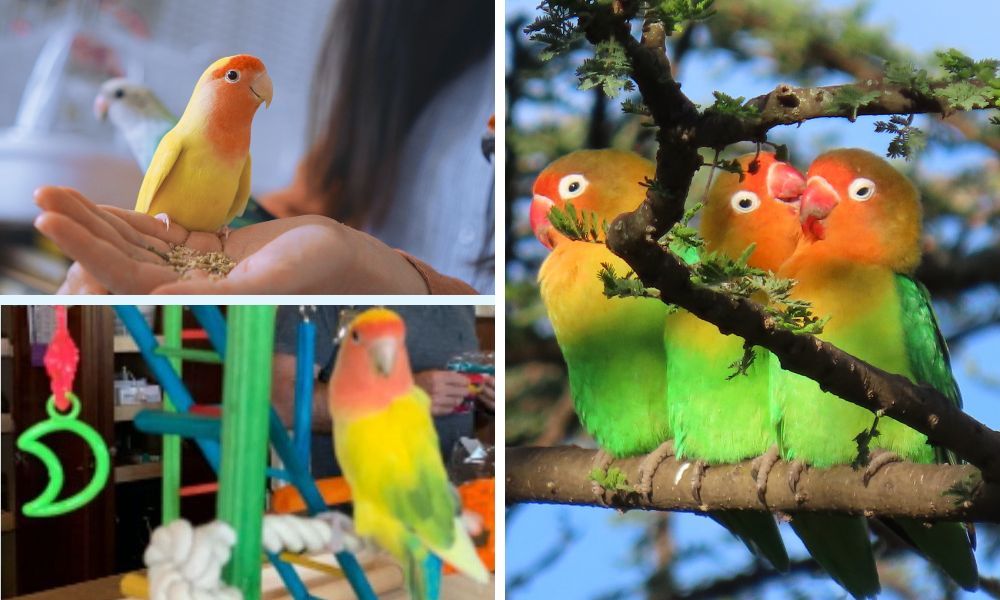
Love birds are popular pets because of their beautiful colors and affectionate personality. As a lover of these feathered creatures, it is important to ensure that they are well-fed and kept healthy. In this blog post, we will discuss the optimal feeding practices for love birds so that they can thrive and live a long life.
Wild Lovebirds
In the wild, love birds typically feed on a variety of fruits and vegetables. They also may consume insects such as grasshoppers, beetles, and caterpillars. It is importan to offer fresh foods to ensure that they remain nutritionally balanced for your pet bird. In the wild, food sources can include berries, leaf buds, vegetation, seed pods, seeds, nuts and other small edibles as they become available from one season to the next. Additionally, it is essential to provide them with a source of calcium such as cuttlebone or mineral grit.
Domesticated Love Birds
When it comes to feeding domesticated love birds, there are a few different options. There are specialized pellets that can provide your pet bird with all the essential nutrients they need for optimal health. Alternatively, you can feed them seeds and other healthy snacks such as fruits, vegetables, and nuts. It is important to ensure that these snacks are fresh and free of pesticides. Additionally, it is essential to provide them with a source of calcium such as cuttlebone or mineral grit as well.
Seed Mixes vs. Pellets
One of the most common questions when it comes to love bird feeding practices is whether to use seed mixes or pellets. While seed mixes may be more appetizing for love birds, it is important to note that they are not nutritionally balanced. Pellets, on the other hand, contain all the nutrients that love birds need for optimal health. Therefore, it is recommended to use pellets as the primary food source for love birds, supplemented with some seeds and fresh fruits and vegetables.
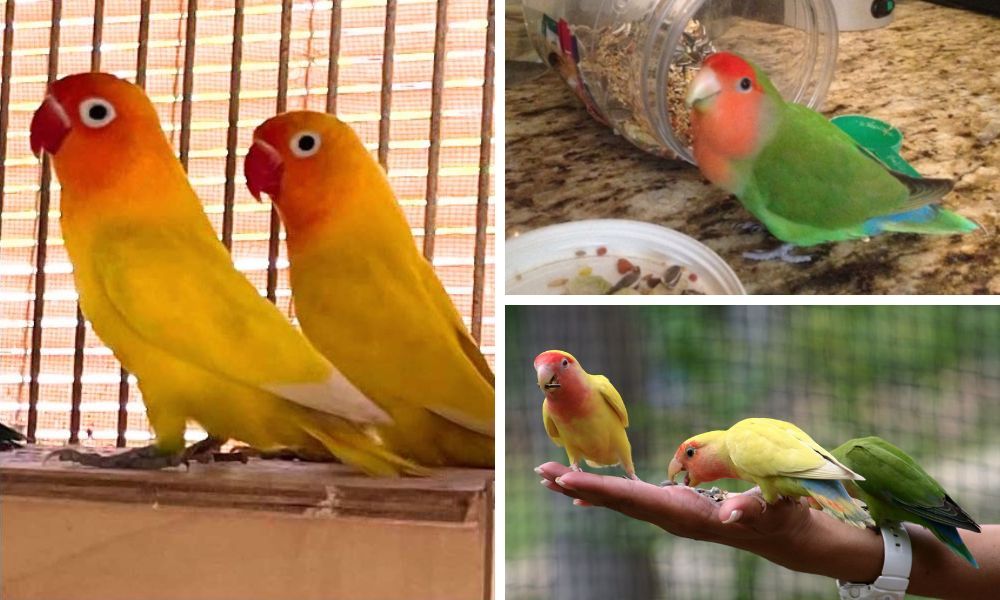
Fresh Fruits and Vegetables
Fresh fruits and vegetables are essential components of a lovebird's diet. They provide vitamins, minerals, and fiber, which promote healthy digestion and boost their immune system. Some of the recommended fruits and vegetables for love birds include apples, bananas, blueberries, grapes, carrots, broccoli, and spinach. It is important to note that some fruits and veggies can be harmful to love birds, such as avocado, onion, and rhubarb. Make sure to do your research before introducing any new food items to your love bird's diet.
Water and Calcium
Water is crucial for a love bird's hydration and overall health. Make sure to provide clean and fresh food and water at all times. Additionally, love birds need a source of calcium in their varied diet to maintain healthy bones and prevent disorders such as egg-binding. Cuttlebones, calcium blocks, and crushed eggshells are all great sources of calcium for love birds.
Feeding Schedule
Establishing a feeding schedule for your love bird is important to maintain their weight and overall health. Love birds should be fed twice a day, with their primary meal in the morning and a smaller meal in the evening. It is also important to monitor their nutritious food intake, as overfeeding can lead to obesity and health issues. A general guideline is to offer no more than two tablespoons of pellets or seeds per day, along with fresh fruits and vegetables.
Treats
Treats can be a great way to bond with your love bird and provide them with some variety in their diet. However, it is important not to overdo it with treats, as they can be high in sugar and fat. Stick to healthy treats like millet sprays, small amounts of plain popcorn, or unsalted nuts. Avoid giving your love bird treats that contain chocolate, caffeine, or alcohol, as these can be toxic to birds.
Pelleted Lovebird Food
Pelleted food is a great way to ensure that your pet bird is getting all the essential nutrients they need for optimal health. Pelleted diets are complete and balanced, meaning it contains all the vitamins and minerals required for healthy growth and development. Additionally, many pelleted diets contain probiotics which can help with digestion and nutrient absorption. Additionally, pellets are generally easier to store than seeds, as they have a longer shelf-life.
Baby Lovebirds
Baby lovebirds have different nutritional needs than adults. They require a higher fat content in their diet to support their rapid growth and development. It is important to provide them with a specialized baby bird formula that contains high-quality proteins, fats, carbohydrates, vitamins, and minerals. Additionally, it is essential to ensure they have access to fresh fruits and vegetables as well as cuttlebone or mineral grit for calcium.
Overall, feeding your love bird the right food is essential to maintain their health and wellbeing. Make sure to provide a balanced diet of pellets, fresh fruits and vegetables, and occasional treats for optimal nutrition. Give them enough water throughout the day and make sure they have access to calcium sources like cuttlebones or crushed eggshells. Lastly, establish a feeding routine that works best for you and your love bird. With proper care, your feathered friend will be sure to live a long and happy life!
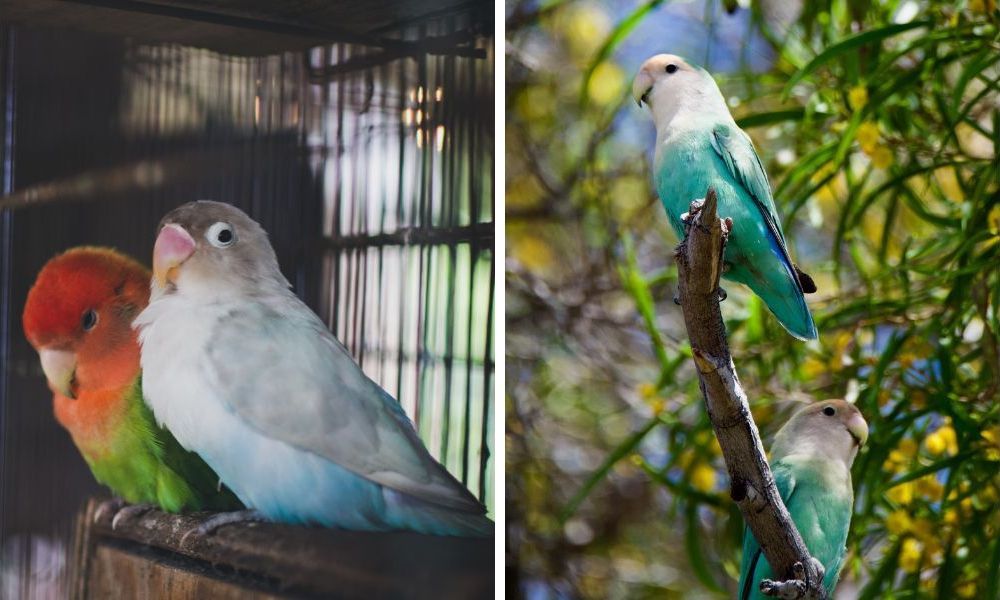
FAQs
What is the best bird food for lovebirds?
The best lovebird food is a balanced diet of pellets, fresh fruits and fresh vegetables, and occasional treats. Pellets are the most nutritionally balanced option for providing essential vitamins and minerals to your pet bird. Additionally, it is important to provide them with fresh produce and calcium sources like cuttlebone or mineral grit.
How often should I feed my lovebird?
It is recommended to feed your lovebird twice a day, with their primary meal in the morning and a smaller meal in the evening. A general guideline is to offer no more than two tablespoons of pellets or seeds per day, along with fresh fruits and vegetables.
What treats can I give my lovebird?
Treats should be given in moderation. Stick to healthy treats like millet sprays, small amounts of plain popcorn, or unsalted nuts. Avoid giving your love bird treats that contain chocolate, caffeine, or alcohol, as these can be toxic to birds.
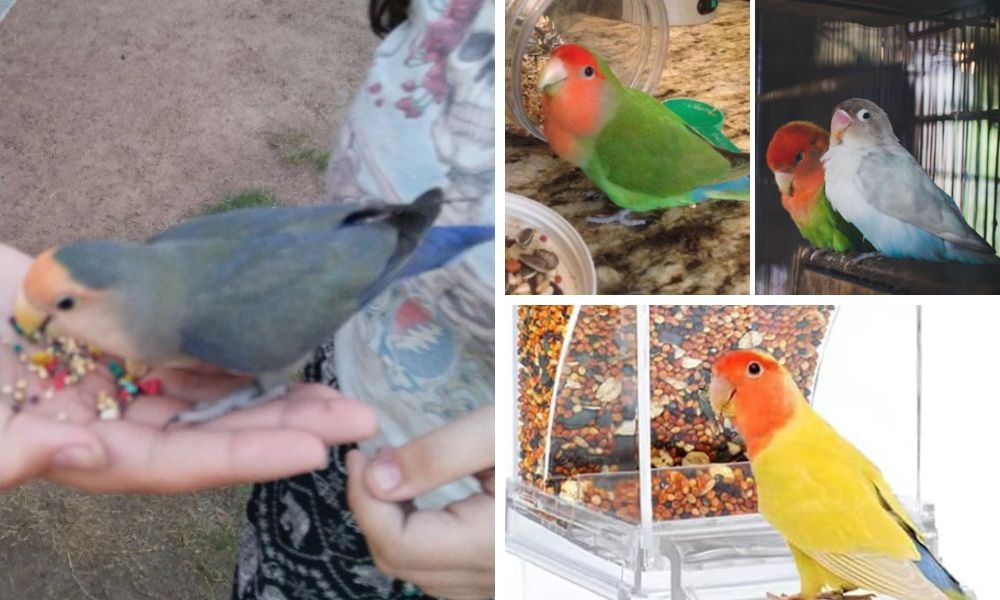
What food should I give baby lovebirds?
Baby lovebirds require a higher fat content in their diet to support their rapid growth and development. It is important to provide them with a specialized baby bird formula that contains high-quality proteins, fats, carbohydrates, vitamins, and minerals. Additionally, it is essential to ensure they have access to fresh fruits and vegetables as well as calcium sources like cuttlebone or mineral grit.
Is seed mix good for pet birds?
Seed mixes can be a good supplement to a love bird's diet, but they should not be the primary food source. Pelleted diets are complete and balanced, meaning it contains all the vitamins and minerals required for healthy growth and development. Look for a seed mix that has a wide variety of seeds like millet, canary grass seed, hulled oats, niger seed, flax seed,sunflower seeds, safflower, and grape seeds. It is important to offer variety in their diet, so seeds can be used to provide additional nutrition and flavor to your love bird's meals.
Are fruits and vegetables good for lovebirds?
Fruits and vegetables are great sources of vitamins, minerals, and fiber that can help promote healthy digestion and boost their immune system. Some of the recommended fruits and veggies for love birds include apples, bananas, blueberries, grapes, carrots, broccoli, and spinach. However, it is important to note that some fruits and vegetables can be toxic to birds, so it is best to research which ones are safe for them.
What feed do lovebirds eat?
Lovebirds eat a variety of feed including pellets, seeds, and fresh fruits and vegetables. Pelleted diets are complete and balanced, meaning it contains all the vitamins and minerals required for healthy growth and development. Additionally, many pelleted diets contain probiotics which can help with digestion and nutrient absorption. Seeds can also be offered as an additional food source to provide a variety of flavors and textures. Lastly, fresh fruits and vegetables are a great source of vitamins, minerals, and fiber that can help promote healthy digestion and boost their immune system. You can read more about what to feed your lovebirds here or by clicking the picture below.
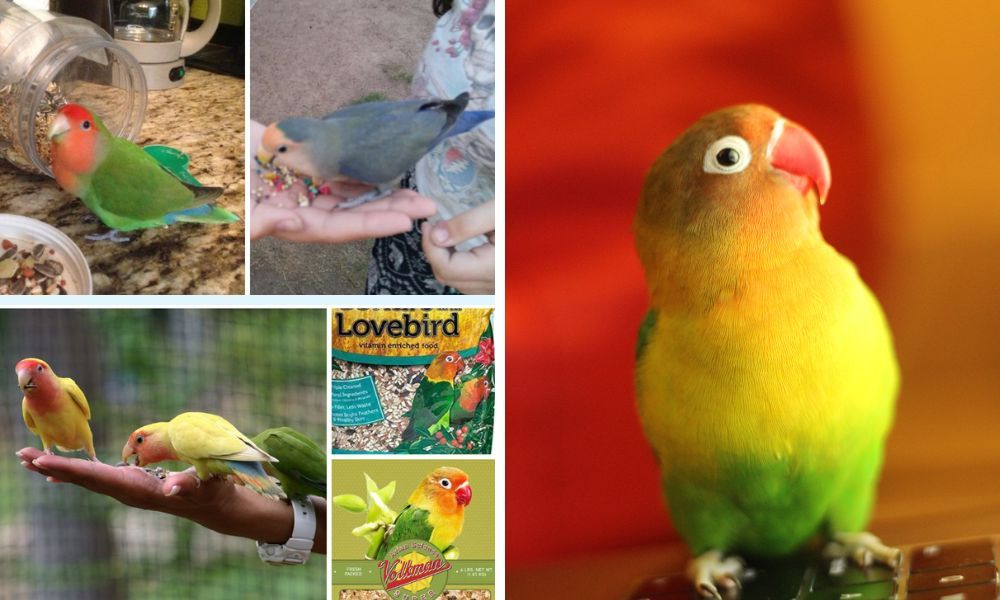
What vegetables do lovebirds eat?
Some of the recommended vegetables for love birds include carrots, broccoli, peas, spinach, kale, and bell peppers. However, it is important to note that some fruits and vegetables can be toxic to birds, so it is best to research which ones are safe for them. Additionally, make sure to wash all produce thoroughly before feeding it to your pet bird.
What bird food can lovebirds not eat?
Lovebirds should not be given treats that contain chocolate, caffeine, or alcohol as these can be toxic to birds. Additionally, it is best to avoid offering any processed or fried foods such as chips and French fries. Lastly, refrain from feeding your love bird avocados as they are also known to be toxic.
Can love birds eat rice?
Rice can be a safe addition to your love bird's diet, but it should not be the main source of nutrition. Rice is low in protein and other essential nutrients and should only be fed as an occasional treat. Additionally, many pelleted diets are enriched with rice or other grains which provide all the necessary vitamins and minerals for healthy growth and development.
Can lovebirds eat bread?
Bread should generally be avoided in a love bird’s diet as it is low in nutrients and can cause digestive issues. Instead, focus on providing a balanced diet of pellets, fresh fruits and vegetables, and occasional treats for optimal nutrition. Give them enough water throughout the day and make sure they have access to calcium sources like cuttlebones or crushed eggshells. With proper care, your feathered friend will be sure to live a long and happy life! See our list best of love birds food below by clicking the picture below.
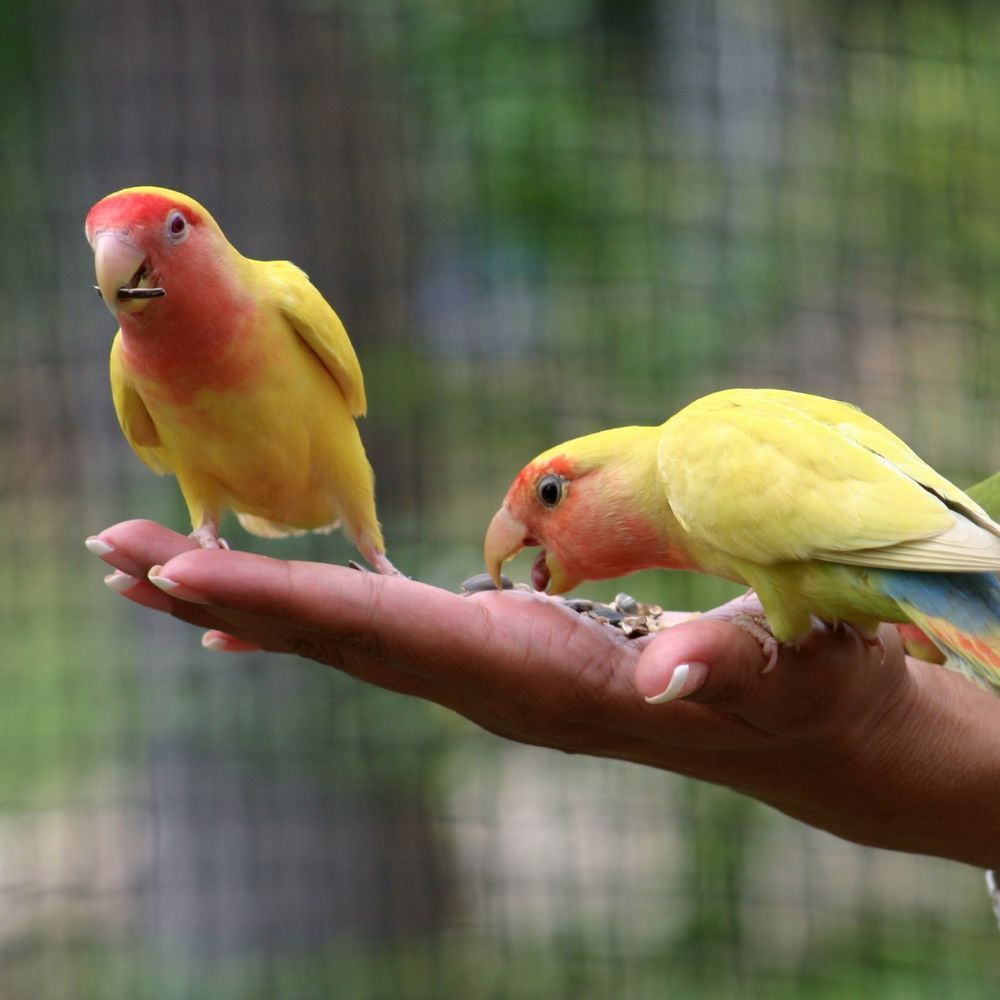
At the end...
proper feeding practices are essential for the health and well-being of your love bird. A diet consisting of pellets, fresh fruits and vegetables, and sources of calcium is necessary to ensure that your bird receives the necessary nutrients. Additionally, establishing a feeding schedule and monitoring your bird's food intake can prevent health issues such as obesity. Remember to provide clean and fresh water at all times, and only provide treats in moderation. Taking care of your love bird's nutritional needs will help them live a long and happy life. Check out our top 5 picks for the best bird food for lovebirds by clicking the button below!

